- Home
- Sam Siciliano
The Grimswell Curse Page 6
The Grimswell Curse Read online
Page 6
“Are you quite certain of that, madam?”
“I have heard him say it often enough, haven’t I? He is a younger son, isn’t he? And his father is an even greater dolt than he. His brother will get the land, the estate and all the income. The entail has protected that from Hampsford’s stupidity, but Freddie will be lucky if he gets a hundred a year. He owes ten or twenty times that much. Of course, his debts have doubled in the last month, now that his credit is good again. They are only too happy to lend him money. Oh, I will not stand for it—I will not! I told him we could run away together and start over. We could go to Australia or America and have a new life together. We could scrape up a couple of hundred pounds between the two of us. That would be enough.”
“And leave his creditors in the lurch?” Holmes asked.
She smiled fiercely. “They are mostly a bunch of money-grubbing Jews.”
“Perhaps, but they will no doubt collect from someone—his family or those friends ill-advised enough to back him.”
“They can afford it.” She laughed harshly. “They will not starve, Mr. Holmes.”
Holmes gave a slight shrug. “Pardon me, madam, but you have me at a disadvantage. We have not been introduced.”
“Oh, that’s easily remedied. I am Alice Dobson, the Honorable Alice Dobson.” Her voice was again heavy with sarcasm. “My father was a baron who blew his brains out over some financial scandal. He left his wife and baby daughter with almost nothing. His brother got the title and the estate. Of course, that is how I learned to take care of myself.”
Holmes hesitated. “I am certain you are quite good at it.”
She gave a savage laugh which bared her teeth. “Oh, I am, you can be certain of that. I have had considerable practice. I have learned exactly what price honor and virtue have. It is much easier being virtuous when you are rich—and stupid. Virtue is worth nothing without a dowry. Even a penniless lord like Digby will not marry me. I might find some barrister or banker with pretensions and live in a hovel, but money wants money—more money, Mr. Holmes, and not virtue. In spite of all the pious hypocrisies, virtue is cheap. No one will pay a penny for it.”
Holmes lowered his hands. “I fear there is some truth in your observations, Miss Dobson.”
She laughed again, her eyes suddenly full of tears. “I gave Digby everything he wanted, Mr. Holmes—I denied him nothing—and this is how he repays me. I did not necessarily expect him to marry me, but I did not expect him to—to run off with the first wealthy heiress he could get his hooks into. The girl would be a fool to marry him. I know what he is—I am a match for him, but some poor innocent... cow.” She bared her teeth, clenched them. “Some poor little romantic twit who knows no better, who takes his protestations of love seriously—who thinks he really cares for her when all he wants is her fortune... I will not have it, Mr. Holmes—I will not.” She choked off her words. Tears started out of her right eye, but she wrenched off her glove and wiped angrily at it. Her hand was small, white and delicate.
Holmes sighed. “What do you want of me, Miss Dobson?”
“I want you to stop it—I want you to stop him. Tell Miss Grimswell that her would-be fiancé is a bounder who is only after her money. Tell her that he has already been the ruin of one virtuous maid.” A sharp laugh burst from her lips, then the tears began again. She pulled out a handkerchief and dabbed at her eyes.
“Please, madam, calm yourself.”
“I will not calm myself—but you must not think—he has not hurt me—I am only angry—so very angry—I can hardly think straight. I am...” She put her hand on her forehead. She had grown quite pale, her face resembling the icy white marble of a statue.
Holmes stood up. “Please sit down, Miss Dobson.”
“I... I shall not.”
He gestured at the wicker chair with its soft cushion. “Do sit down.” She did so. Holmes walked to the sideboard, then poured brandy from a decanter into a glass. He handed it to her. “Drink this.”
She swallowed about half the glass, gasped, her face reddening, then lowered it. “Thank you,” she mumbled. “I...”
“Take a minute to compose yourself.”
She sighed, then took another swallow. “He makes me so angry,” she murmured to herself. “God, how I wish... how I wish I was someone else. If I were a man, if I were only a man, none of this would ever...” She sipped the brandy, then smiled up at Holmes. She was a remarkably beautiful woman. “I should have been a man, Mr. Holmes. I have brains and will enough. I have the strength that Digby lacks. But what good is it—without money? It always comes down to money.” She laughed softly, her eyes glistening, then sipped the brandy.
Holmes said nothing, but watched her silently. The breeze from the window stirred the papers on his desk.
At last she sighed and looked up, a faint blush on her cheeks. “You both must think me a fool.”
Holmes shook his head. “No.”
“I can see it has been very difficult for you,” I said.
She gave a dull laugh. “Difficult. Yes, it has been difficult.”
Holmes hesitated. “But now you know what kind of man he is. You have learned before it is too late.”
She laughed once, then sobbed, a dry, shuddering sound that made me wince. She wiped at her cheek with the handkerchief. “But I have always known what kind of man he is—since the first moment I met him. It is obvious, isn’t it?” She laughed, then looked at us both. “How could I want such a vain, shallow, spineless man? I have asked myself that many times.” She bowed her head. “Yet I do. And how could I ever let him wound me so?—I, who...”
Holmes hook his head. “Please, madam.”
She drew in her breath, then let out a sigh. “Forgive me for this display of female hysterics. I only...” She swallowed the last of the brandy and set down the glass. “I know your reputation, Mr. Holmes. Do not let Lord Frederick marry Miss Grimswell. He does not love her—he only wants her fortune.”
Holmes smiled. “Neither Lord Frederick nor the lady have asked my advice on their matrimonial intentions. Besides, the engagement at present seems to be off. Someone has been... I think someone has been threatening Miss Grimswell.”
His gray eyes peered intently at her. She raised her chin and stared back calmly. “Oh, that is probably Freddie, too.”
I frowned. “But she has broken off the engagement.”
“That will change. It is probably all part of his plan. Digby is not stupid, even though he acts that way. He will not let her escape, not now. You must not let him get away with it, Mr. Holmes—you must not. I do not know what he is paying you—it must be her money—but...”
“He is paying me nothing. Not yet. And as I have told Miss Grimswell, I am mainly concerned with her well-being.”
“Then you must save her from him.” The word “save” was faintly ironic. “I do not really know anything bad of her, but of course I hate her.” She smiled fiercely. “Oh God, it is all so stupid. I know I would be better off without him, but I cannot give him up. I must go. I have made enough of a fool of myself.” She stood, then swayed slightly, putting her hand over her forehead.
Holmes’s hand shot out and seized her arm below the shoulder. I stood up at once. She smiled weakly. “You need not worry, gentlemen. I am well.” Her pallor contradicted her words. “I am a fool, but I am not... I am not an idiot. I am not suicidal. I only wish to kill Freddie.” She laughed harshly, then noticed the expression on Holmes’s face. “I am joking. I do not mean it. I really must be going.”
Holmes still held her arm. “One thing puzzles me, madam. You heard Lord Frederick repeatedly insulting Miss Grimswell, but you have known for a long time that he wanted to marry her for her fortune. Why, then, did you remain with him? And what has changed to so infuriate you?” He lowered his hand.
“Yes, we joked about her all the time, but he had said that once they were married...” Her eyes stared out the window off into the distance. “He would have the giantess’s fortune,
but it would make no real difference for us. We two might still...” Her cheeks reddened.
“He is a bounder!” I exclaimed.
“Oh, yes, and a liar. He had said the marriage would not matter, but then... He told me we were finished—that it was all over.”
“When did he tell you this?” Holmes asked.
“Last Friday. I could not believe him.”
“What reason did he give you?”
Her mouth widened, twisting into a grin which bared her teeth. “He said... he said it wouldn’t do... wouldn’t do... for a married man to—”
“Enough, madam—you have told me enough.”
She straightened her back, closed her eyes, her fists clenched. Her breath made a kind of hiss escaping through her teeth. She pulled on her gloves and started for the door. I walked over and opened it for her. She nodded.
“Miss Dobson,” Holmes said. She turned to him. He had folded his arms. “Thank you for coming to see me.”
Her mouth twitched, and finally formed a smile. “The pleasure was mine.” Her eyes were red, her face fearfully pale.
I closed the door behind her. “Poor woman,” I murmured.
“She will recover,” Holmes said. “She has a strength rarely found in women—or men.”
“I thought Digby was an imbecile, but now I know him for a villain. To think...”
“Come, come, Henry. We know no such thing.”
“Can you doubt he has ruined the poor girl?”
“She was a willing party to it all. You heard her. And how many noble bachelors do you think go to the altar without some such sordid affair in their past? At least he had the decency to finally break things off.”
“Decency—decency?”
Holmes laughed. “A poor choice of words, I grant you, a very poor choice.”
“Miss Dobson has been gravely wronged.”
Holmes smiled, but his gray eyes showed no humor. “The world is full of such wronged people. She went along with Digby. I am sure she was a match for him. Unfortunately the heart often pays little attention to the brain. Even you must admit she is probably well rid of him.”
My frown slowly faded. “Yes, I suppose that is true. But there was a certain truth to her ravings. It is difficult for a woman to marry well without money.”
“Miss Dobson will manage.”
“How can you be so sure?” I asked.
“Because she is beautiful. Beautiful women have a way of looking after themselves.”
My frown returned. “That may also be true, although I do not care for your cynical tone.”
“How can one regard the behavior of men and women and avoid cynicism?” He went to the window and drew in his breath, his back to me, his fingers grasping at the sill. “What does it all mean, this pathetic mating dance? These lacerated hearts, these ridiculous longings and desires, this incessant pain—all this... nonsense.” He was quiet briefly. “Why should such a simple business cause such turmoil? Man is unique among the animals in this respect. For them it is all roaring, growling or butting horns, and then they run off, or they have what they desire—for the moment. They are better off than we.”
I stared at his back, astonished at his fervor. “No,” I said. “They are not better off.”
“No?” He still would not face me.
“No.” I took a step nearer. “Once it is all settled... If you really love one another, then it is quite wonderful.”
He turned, a tight smile on his lips. “I shall have to take your word for it. I fear, however, that this particular episode has not turned out so well for Miss Dobson. All the same, she is a woman—as she said—who has learned to take care of herself. She will find some lovesick puppy who will take her, money or no money, reputation or no reputation.”
“That is cruel,” I said. “And what of Lord Frederick? Is he blameless?”
“No one is blameless, Henry. But you are mistaken if you think I cannot see his faults. Miss Dobson told me little I did not suspect. Have I not harped upon Miss Grimswell’s fortune? Are his intentions not obvious to anyone? Even Miss Grimswell must have her suspicions.”
He picked up his pipe from the ashtray where he had set it. “I did learn one thing. His cruelty is something of a surprise—the ‘giantess’ and the ‘milk cow.’ He has a mean streak beneath his tiresome amiability.” He relit the pipe, drew in two or three times to get it going, then eased out a breath of smoke. “I do not care for men who are cruel to women, regardless of the women’s class, virtue or appearance. And if he intends in any way to harm Miss Grimswell, he will pay for it—he will pay dearly.” If Digby could have seen Holmes at that moment, he might have reconsidered coming to Dartmoor with us.
Four
Late the next day Holmes and I climbed into a crude rented carriage, aptly called a dog cart, and started off for Grimswell Hall. Lord Frederick raised his hand in a grudging farewell. Stern words from Holmes and his threatening to abandon the case (something I knew he would never do) had persuaded Digby to remain behind at the Grimpen inn for one night. Holmes had also argued that it was unclear how the lady would receive us—her servants might not admit us—but two would be less overwhelming than three. Shrewdly, he also suggested he would help prepare the way for Digby’s triumphal arrival the next day.
After several hours on the train enduring Digby’s incessant chatter, Holmes and I were only too glad to sit in silence and enjoy the ride. A cold dreary rain had been falling in London, but shortly before we reached Grimpen, the sun had broken through the clouds. Now its golden light gleamed along the desolate length of the moor, the autumnal heath and bracken a radiant brown along the rolling earth.
I had not been to Dartmoor before, but it reminded me of the moors of northern Yorkshire. One had the same sense of the sky somehow opening up, becoming more vast, yet somehow nearer; the sky joined with the land to form a single mute presence, a great slumbering creature, brown and gray and cavernous, a dormant behemoth with a cold misty aura. The old gods of earth and sky lurked nearby, and relics of Neolithic man—a solitary monolith of jagged black granite all spotted with brilliant lichens or smaller, mossy slabs protruding from the smooth turf—were at one with the landscape, so much so that the man-raised menhir seemed a brother to the natural tors atop the hills. One set of smaller stones formed a circle, jagged teeth making the O of a giant, frozen mouth.
The air was wonderful after the stink of London, but to call something so rich, dank and heavy “fresh” would be a misnomer. Decay was predominant, the smell of all that decomposing plant matter, fallen leaves from the small patches of forest or from the brown and shriveled outer layers of ferns. The smell reminded me of wine, some vintage Burgundy or Bordeaux with a dark, smoky taste. The cold wind had a bite, the dampness making it cut through wool to touch the skin.
We had followed the worn ruts of a dirt road up the slope away from the village. Once we reached the summit and descended, all sight of the village or the modern works of man were gone. The road rose and fell, skirted a small wood of alder, their leaves yellow, the ferns thick underneath with an occasional dense growth of whortleberry bushes with shriveled blue fruit, then the road rose and fell again.
We came to a small stream, its icy rushing waters flowing over glossy brown stones. The driver brought the horses to a halt. “Best jump down, gents, and cross afoot. It’ll be a rough ride o’r the bridge in the back there.”
Holmes and I stepped down and saw before us one of the so-called clapper bridges, made of slabs of granite resting on supporting stone piles. Since the slabs were nearly a foot thick, the effect was like that of a step, and there were two such steps up, then two down. Holmes tapped at the granite with the steel ferrule of his stick. He wore a suit of heavy gray tweed, brown boots with thick soles, and a black hat with a narrow brim. The air had brought some color to his cheeks, and he looked better than he had in weeks. The carriage jounced and swayed as its wheels went up over the first step.
“Walking is defini
tely preferable,” Holmes said as we strolled along the bridge behind the carriage. Beneath us the clear icy water swept loudly downstream on its long voyage to the distant sea. “Look there, Henry.” A gray shimmery shape swept by and vanished under the bridge.
“Good heavens, that looked to be an enormous fish.”
“Perhaps it was a pike. There are salmon in these streams, too.”
“Salmon—here?”
“Yes. I have seen them swimming upstream to spawn in the torrents of early summer. A memorable sight.”
The wind over the water felt very cold, and I restrained a shiver. My jacket was a thick wool, but not so heavy as Holmes’s. The sun had sunk low in the sky, a muted yellow circle behind a bank of gray clouds, and the blue patches of sky seemed to be shrinking. One particularly billowy patch of clouds seemed to be swirling in from the east so fast you could see them move.
I pulled out my watch. “It will be dark in another hour. I should not like to be out here under a cloudy sky at night.”
“That is when another hunter, the owl, replaces our friend up there.” Holmes pointed with his stick. High above a bird soared, its immense brown wings spread straight out.
“Some sort of hawk?”
“The common buzzard, one of the largest of the aerial predators.”
“Buzzard seems a humdrum name for so magnificent a bird.”
“It is, especially as the Americans refer to a species of scavenging vultures as buzzards. Our buzzard up there is a cousin to the eagles, another of the lords of the air.”
The buzzard suddenly circled about, dropping downward, its wings opening up as it vanished behind the stand of alders.
“No doubt he has found his supper,” Holmes said. “Probably a vole or hare if he is lucky.”
“Poor creature,” I murmured.
“You are being maudlin, Henry. One could argue that falling prey to so magnificent a bird is a better end than most. It is quick and relatively painless. It is a vole’s fate to end up in the stomach of some predator— an owl, a buzzard, a kestrel, a fox, an adder. It is a mistake to attribute human emotions to the buzzard or the vole. There must exist between them a curious sympathy, a strange bond. The vole’s end is not tragic, only natural, and there is no malice in the buzzard. No, the predators of the natural world are not cruel, nor malevolent.”

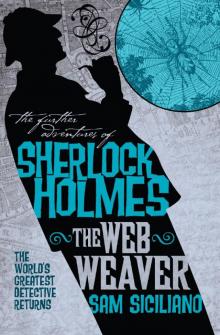 The Web Weaver
The Web Weaver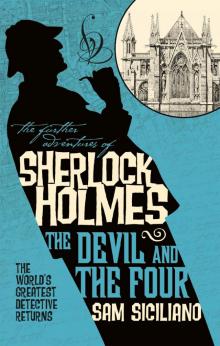 The Further Adventures of Sherlock Holmes--The Devil and the Four
The Further Adventures of Sherlock Holmes--The Devil and the Four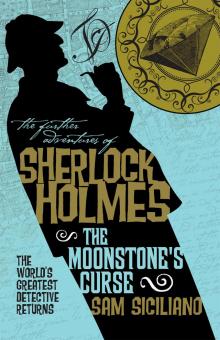 The Moonstone's Curse
The Moonstone's Curse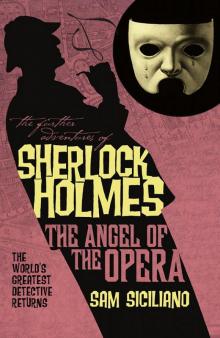 The Angel of the Opera
The Angel of the Opera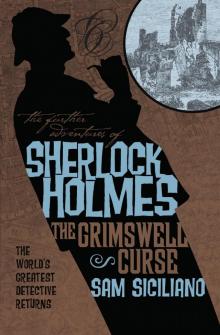 The Grimswell Curse
The Grimswell Curse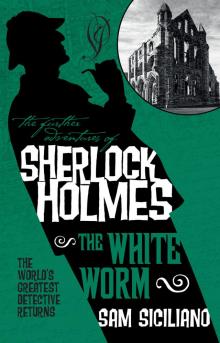 The White Worm
The White Worm